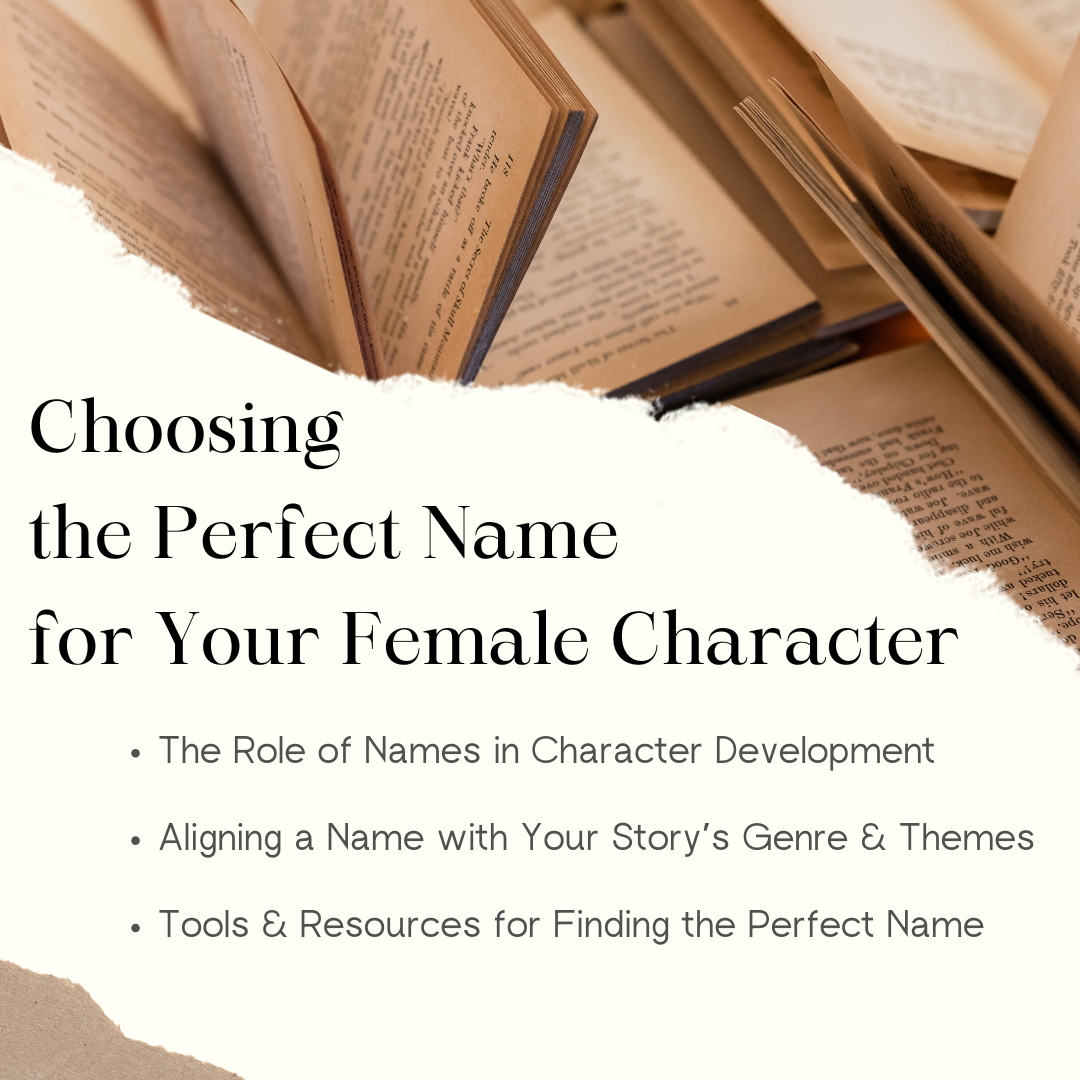
Choosing the Perfect Name for Your Female Character
Why Your Character’s Name Matters
Naming your characters might seem like a small decision, but the right name can shape how readers see them before they even speak a word. A well-chosen name adds depth, reinforces themes, and makes a character more memorable. Think about it—would Katniss Everdeen have had the same impact if she had been named Susan Thompson? Probably not.
A good name sets the tone. A dark, brooding assassin named Daisy Sparkleton isn’t going to land the way you want (unless you’re going for irony, in which case, carry on). But if your character is a fierce warrior with a tragic past, a name like Seraphina (meaning “fiery” in Hebrew) immediately gives her weight and intensity.
The key is making sure the name fits your story’s setting and tone. A modern-day romance lead probably wouldn’t be named Guinevere unless she had history-obsessed parents. Likewise, if you’re writing high fantasy, a character named Jessica might feel out of place next to characters named Thalorin and Elira.
In short, names matter. They shape first impressions, reinforce world-building, and can even hint at character arcs. The goal is to pick a name that doesn’t just sound cool but actually fits your story’s world and the person you’re creating.
The Role of Names in Character Development
Names do more than just help readers tell characters apart—they set the tone for who that character is. A name can hint at personality, background, and even the role they play in the story. Would Darth Vader be as intimidating if he were named Bob Smith? Probably not.
Think about what you want your character’s name to say about them. A soft, flowing name like Elowen or Lilia might suit a kind-hearted healer, while something sharp and punchy like Nyx or Jax fits a tough, no-nonsense fighter. If your character is an old-school aristocrat, a name like Cornelius or Genevieve makes sense. But if they’re a street-smart rebel? Maybe not so much.
Names can also reflect a character’s journey or growth. A shy, overlooked character might go by a nickname or shortened version of their name early on but fully embrace their full name as they grow into their strength. Think of how The Hunger Games gradually shifts from calling its protagonist “Kat” to the full “Katniss” as she becomes more confident and powerful.
And then there’s reader perception. If you name your villain Damien, readers will instantly assume he’s bad news. If your heroine is named Bella, readers might picture a soft-spoken, lovestruck character before they even meet her. These associations come from pop culture and history, so it’s worth considering what baggage a name might carry.
At the end of the day, names should feel natural for the world and personality of your character. If it sounds forced, complicated, or totally mismatched, readers will notice. Test out different names, say them out loud, and see if they feel right for the person you’re creating
Aligning a Name with Your Story’s Genre & Themes
Picking a character’s name isn’t just about what sounds cool—it has to fit the world you’re building. A name that works perfectly in one genre might feel completely out of place in another. Imagine a gritty crime thriller where the detective’s name is Sparkle McSunshine. Unless it’s a comedy, that’s going to feel pretty weird.
Fantasy & Mythology
Fantasy names often have a sense of grandeur or history to them. They can be inspired by ancient languages, mythology, or completely made up. Think Arwen from Lord of the Rings or Daenerys from Game of Thrones. These names sound unique, but they still fit their worlds. If your story has magic, mystical creatures, or gods, names with deep meanings or poetic sounds work well.
Example Names: Seraphina (fiery, Hebrew), Callidora (gift of beauty, Greek), Zephyra (west wind, Greek).
Historical Fiction
If your story takes place in a specific time period, make sure the name matches. A Victorian-era noblewoman named Madison? Unlikely. A medieval knight named Kyle? Not so much. Do a little research to make sure your names fit the time and culture of your setting.
Example Names: Eleanor (French/English royalty), Beatrix (voyager, Latin), Gisela (pledge, Germanic).
Modern & Contemporary
For contemporary fiction, your names should feel natural and believable. This is where you’ll see trendy, common, or regionally popular names. A young, tech-savvy protagonist might be named Harper, while a suburban mom might be Lisa.
Example Names: Sloane (modern, sleek), Avery (versatile, unisex), Nova (fresh, rising in popularity).
Horror & Gothic
Dark, eerie stories call for names that add to the mood. Gothic horror thrives on dramatic, old-fashioned names like Ophelia or Lenore, while modern horror can play with irony—naming a final girl “Daisy” when she’s anything but delicate.
Example Names: Raven (dark and mysterious), Belladonna (deadly nightshade, Italian), Selene (moon goddess, Greek).
Romance
Romance names tend to be soft, elegant, or timeless. A brooding hero might have a strong, commanding name like Sebastian, while a heroine in a historical romance could have a classic name like Isabella or Genevieve.
Example Names: Juliette (youthful, French), Lillian (purity, Latin), Evangeline (bringer of good news, Greek).
Sci-Fi & Dystopian
Sci-fi and dystopian stories often feature futuristic, tech-inspired names or simple, minimalist ones. Some authors tweak common names to make them feel otherworldly—like changing “Jessica” to “Jeska.”
Example Names: Nyx (night, Greek), Vesper (evening star, Latin), Astra (stars, Latin).
The bottom line? A name should feel like it belongs in your story. If it clashes with the genre or themes, readers will notice. Pick something that enhances the world you’re building, not something that pulls people out of it.
Cultural & Linguistic Considerations
Names aren’t just words—they carry history, meaning, and cultural significance. If you’re giving your character a name from a culture you’re not personally familiar with, it’s important to do your research. No one wants to accidentally name their fierce warrior princess something that translates to “potato” in another language.
Make Sure the Name Fits the Culture
If your character is from a specific ethnic or cultural background, their name should reflect that. A Viking shieldmaiden named Isabella? Unlikely. A Japanese samurai named Brittany? Probably not. Names are deeply tied to history, traditions, and language, so double-check that your choices make sense.
Example: If your character is from Ancient Rome, a name like Octavia, Livia, or Cassia works. If they’re from feudal Japan, something like Aiko or Tomoe would be a better fit.
Be Aware of Name Meanings
Some names sound great until you realize what they actually mean. Before committing to a name, look up its definition in multiple languages. The last thing you want is for your noble queen’s name to accidentally translate to “garbage” in another country.
Example: The name “Mira” means “peace” in Slavic but translates to “leader” in Arabic. Context matters.
Pronunciation Matters
If your character’s name is impossible to pronounce, readers might just skim over it. This doesn’t mean you can’t use unique or fantasy names, but make sure they’re readable. If your character’s name has 12 silent letters and three apostrophes, you might be pushing it.
Example: X’thynaea might look cool, but no one is going to remember how to say it. Something like Xinae or Thynaea is still unique but way more readable.
Avoid Unintentional Stereotypes
Some names have been overused in ways that reinforce stereotypes—whether it’s villains always having Eastern European names or the “exotic” love interest always getting a flowery, overly dramatic name. Be mindful of where you’re drawing inspiration and whether your choices play into tired clichés.
Example: If every villain in your book has a Russian or German name, maybe mix it up a bit.
Tip: Do the Research
If you’re pulling from a culture outside your own, check historical sources, baby name websites, and even native speakers if possible. A little effort goes a long way in making sure your characters’ names are authentic, respectful, and believable.
Using Name Meanings to Strengthen Symbolism
A name can be more than just a label—it can add extra depth to your character and their journey. If you want to sneak in some symbolism without hitting readers over the head with it, picking a name with a meaningful origin is a great way to do it.
Names That Reflect Personality
Some names naturally fit certain character traits. If your protagonist is a quiet, nature-loving healer, naming her Briar (meaning “thorny bush”) or Sylvie (meaning “from the forest”) subtly reinforces that. On the flip side, if your villain is a power-hungry ruler, names like Victor (meaning “conqueror”) or Kaine (meaning “battle”) might hint at their nature before they even do anything bad.
Example: The name Cassandra means “prophetess” in Greek mythology. If your character has visions of the future, this is a great fit. But if she ignores all warnings and charges into danger anyway, it adds an ironic twist.
Names That Foreshadow a Character Arc
A character’s name can also hint at where their journey is headed. Maybe your heroine starts out timid but grows into her strength—naming her Matilda (meaning “mighty in battle”) can add an extra layer of significance once she fully steps into her power.
Example: The name Phoenix symbolizes rebirth and transformation. If your character goes through a massive personal evolution, this could be a perfect choice.
Irony in Names
Sometimes, giving a character a name that completely contradicts their personality can make them more interesting. A hardened assassin named Mercy? A shy, soft-spoken character named Blaze? These unexpected choices can make readers curious about the story behind the name.
Example: If you name your brooding, battle-hardened warrior “Daisy,” it immediately raises questions—and could hint at a hidden side of them.
Tying Names to Story Themes
If your book has overarching themes, a name can reflect that in a subtle way. A story about destiny and fate might feature characters with names like Moira (which literally means “fate” in Greek). A book about survival might have characters named Sage (meaning “wise”) or Conrad (meaning “brave counsel”).
Example: In *The Hunger Games*, Katniss’s name comes from an actual plant that’s known for being tough and resilient—just like her.
Tip: Don’t Overthink It
If a name’s meaning naturally adds something extra to your story, great. But don’t force it. A name should feel right for the character, not like a vocabulary lesson for your readers. The best symbolic names are the ones that make sense even if you never explain them.
Tools & Resources for Finding the Perfect Name
Naming your characters doesn’t have to be a stressful, hours-long process of staring at baby name lists until all words lose meaning. There are plenty of tools out there to help you find a name that fits your character, story, and genre. Here are some of the best ways to track down the perfect name without pulling your hair out.
1. Baby Name Websites
Yes, you might feel a little weird browsing baby names when you’re not expecting an actual baby, but these sites are goldmines for character names. They let you search by origin, meaning, popularity, and even decade.
- Behind the Name – Great for detailed meanings, history, and variations of names.
- Nameberry – Offers name trends, lists, and suggestions based on style.
- BabyNames.com – Simple and easy to search by theme or meaning.
2. Historical & Mythological Name Databases
If your book is historical, fantasy, or inspired by mythology, using names with real historical or mythological roots can add authenticity.
- Gods & Monsters Database – Perfect for finding names of deities, legendary heroes, and mythological creatures.
- Medieval Name Archive – A collection of names from different medieval cultures.
- Ancient Roman & Greek Name Lists – Google will lead you to several databases filled with historical names.
3. Fantasy & Sci-Fi Name Generators
When you need something a little more unique or out-of-this-world, these tools can give you a head start.
- Fantasy Name Generators (fantasynamegenerators.com) – Covers everything from elves and dragons to cyberpunk hackers.
- Seventh Sanctum – Generates fantasy, sci-fi, and dystopian names.
- The Forge (for writers & RPG creators) – Helps create names with meaning based on themes.
4. Real-World Name Lists
If you’re writing a contemporary novel or historical fiction, checking actual census lists or popular names by decade can make sure your character’s name fits the time period.
- U.S. Social Security Baby Names Database – See which names were common in different decades.
- UK Office for National Statistics Name Lists – Great for British character names.
5. Pinterest & Social Media
Pinterest boards dedicated to character names can be a great source of inspiration. Searching “[fantasy girl names]” or “[powerful female character names]” can lead you to tons of ideas. Social media can also be helpful—scrolling through comments sections or checking out unique names from influencers might spark inspiration.
6. Books & Pop Culture
Sometimes the best names come from books, TV shows, or historical figures. Keep a running list of names that stand out to you while reading or watching movies. Just be careful not to use anything too recognizable unless you’re intentionally making a reference.
Tip: Test It Out
Once you’ve found a name, try saying it out loud, writing it in dialogue, and imagining it in different scenes. If it feels awkward or doesn’t fit the vibe of your story, keep looking. The right name is out there—you just have to find it.
Tips for Making the Name Feel Natural in Your Story
You’ve picked a name. It sounds cool. It fits the character. But does it actually work in the story? A great name can still feel clunky if it doesn’t blend well with the world, setting, or even the way it looks on the page. Here’s how to make sure your character’s name feels natural instead of distracting.
1. Say It Out Loud
If you stumble over your character’s name every time you say it, readers probably will too. Names should flow naturally, especially in dialogue. If your villain’s name is Xyltrivon the Destroyer, but your characters have to say it five times per chapter, that’s going to get exhausting fast.
2. Keep It Reader-Friendly
It’s okay to get creative, but if your character’s name has too many silent letters, apostrophes, or an impossible-to-guess pronunciation, it might slow readers down. If you absolutely must name your protagonist Q’xandriya, consider giving them a nickname people can actually pronounce.
3. Make Sure It Matches the Setting
A futuristic sci-fi hero named Bertha? A medieval knight named Aiden? Not impossible, but probably out of place. Check that your name matches the time period, location, and culture of your story. A small detail like this can make a huge difference in how immersive your world feels.
4. Consider How Other Characters Say It
If every side character is tripping over your protagonist’s name, or if the name doesn’t fit the way people talk in your world, it might stand out in a bad way. A super formal name in a casual setting might feel weird unless that’s part of the character’s identity.
5. Watch Out for Unintentional Patterns
If all your characters have names that start with the same letter or have similar sounds (Elena, Elara, Elian), your readers might start confusing them. Mix it up to avoid unnecessary confusion.
6. Check the Initials
It’s easy to overlook this one, but do a quick check to make sure your character’s initials don’t accidentally spell something awkward. No one wants their noble heroine to be Penny Isabelle Grant.
7. Test It in Different Situations
Write a scene where another character shouts the name in anger. Now write one where it’s whispered in a dramatic moment. Does it still feel right? If not, you might need to tweak it.
Final Thought: If It Feels Forced, It Probably Is
If you have to constantly explain or justify why your character has a certain name, it might not be the right fit. The best names feel like they belong in the story from the start. When in doubt, go with something that fits naturally and won’t pull readers out of the world you’ve built.
- All Posts
- Self-publishing Support





